2019 NISSAN ARMADA remove seats
[x] Cancel search: remove seatsPage 21 of 536
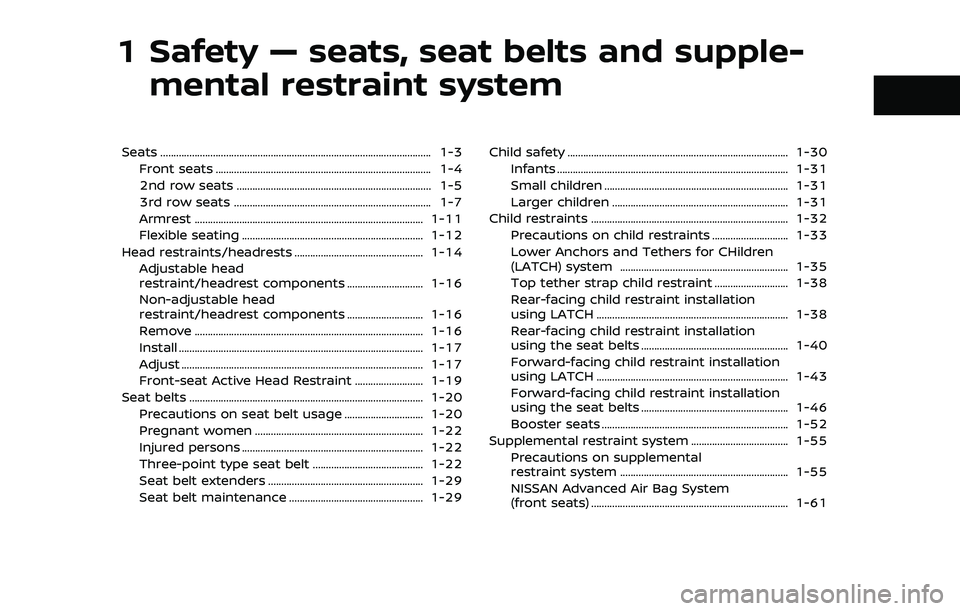
1 Safety — seats, seat belts and supple-mental restraint system
Seats ........................................................................\
............................... 1-3
Front seats ........................................................................\
.......... 1-4
2nd row seats ........................................................................\
.. 1-5
3rd row seats ........................................................................\
... 1-7
Armrest ........................................................................\
............... 1-11
Flexible seating ..................................................................... 1-12
Head restraints/headrests ................................................. 1-14 Adjustable head
restraint/headrest components ............................. 1-16
Non-adjustable head
restraint/headrest components ............................. 1-16
Remove ........................................................................\
............... 1-16
Install ........................................................................\
..................... 1-17
Adjust ........................................................................\
.................... 1-17
Front-seat Active Head Restraint .......................... 1-19
Seat belts ........................................................................\
................. 1-20
Precautions on seat belt usage .............................. 1-20
Pregnant women ................................................................ 1-22
Injured persons ..................................................................... 1-22
Three-point type seat belt .......................................... 1-22
Seat belt extenders ........................................................... 1-29
Seat belt maintenance ................................................... 1-29 Child safety ........................................................................\
............ 1-30
Infants ........................................................................\
................ 1-31
Small children ...................................................................... 1-31
Larger children ................................................................... 1-31
Child restraints ........................................................................\
... 1-32 Precautions on child restraints ............................. 1-33
Lower Anchors and Tethers for CHildren
(LATCH) system ................................................................ 1-35
Top tether strap child restraint ............................ 1-38
Rear-facing child restraint installation
using LATCH ........................................................................\
. 1-38
Rear-facing child restraint installation
using the seat belts ........................................................ 1-40
Forward-facing child restraint installation
using LATCH ........................................................................\
. 1-43
Forward-facing child restraint installation
using the seat belts ........................................................ 1-46
Booster seats ....................................................................... 1-52
Supplemental restraint system ..................................... 1-55
Precautions on supplemental
restraint system ................................................................ 1-55
NISSAN Advanced Air Bag System
(front seats) ........................................................................\
... 1-61
Page 34 of 536
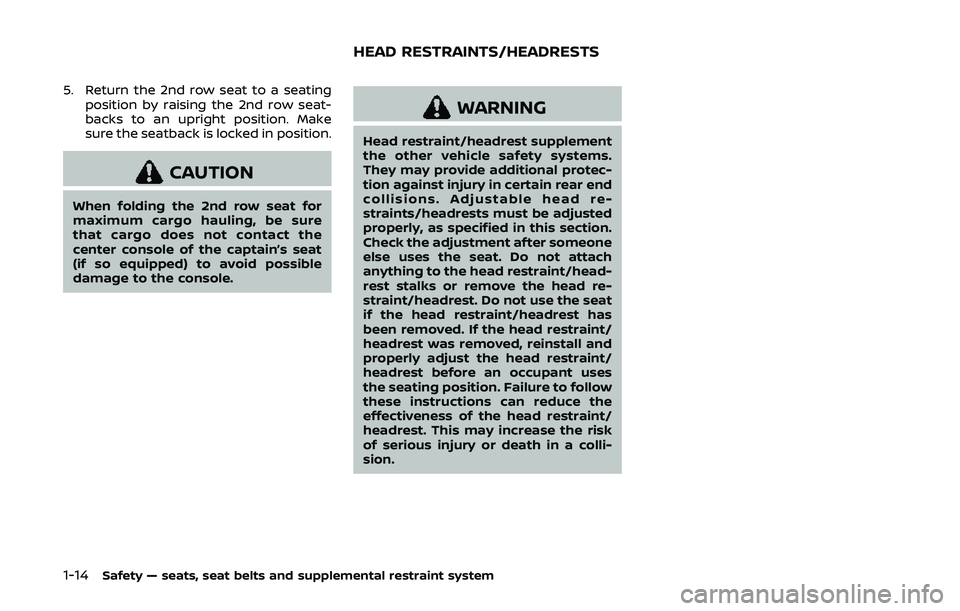
1-14Safety — seats, seat belts and supplemental restraint system
5. Return the 2nd row seat to a seatingposition by raising the 2nd row seat-
backs to an upright position. Make
sure the seatback is locked in position.
CAUTION
When folding the 2nd row seat for
maximum cargo hauling, be sure
that cargo does not contact the
center console of the captain’s seat
(if so equipped) to avoid possible
damage to the console.
WARNING
Head restraint/headrest supplement
the other vehicle safety systems.
They may provide additional protec-
tion against injury in certain rear end
collisions. Adjustable head re-
straints/headrests must be adjusted
properly, as specified in this section.
Check the adjustment after someone
else uses the seat. Do not attach
anything to the head restraint/head-
rest stalks or remove the head re-
straint/headrest. Do not use the seat
if the head restraint/headrest has
been removed. If the head restraint/
headrest was removed, reinstall and
properly adjust the head restraint/
headrest before an occupant uses
the seating position. Failure to follow
these instructions can reduce the
effectiveness of the head restraint/
headrest. This may increase the risk
of serious injury or death in a colli-
sion.
HEAD RESTRAINTS/HEADRESTS
Page 35 of 536
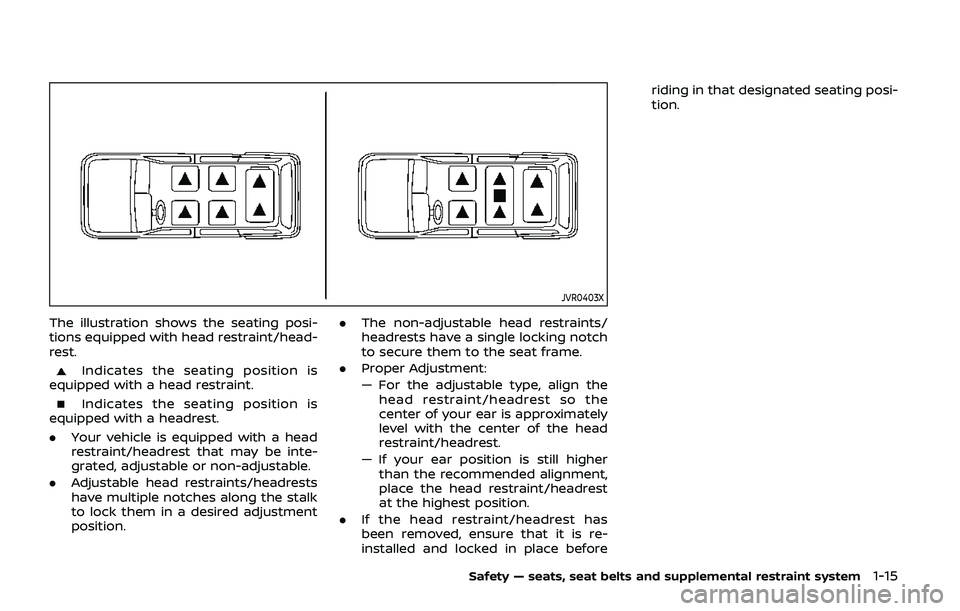
JVR0403X
The illustration shows the seating posi-
tions equipped with head restraint/head-
rest.
Indicates the seating position is
equipped with a head restraint.
Indicates the seating position is
equipped with a headrest.
. Your vehicle is equipped with a head
restraint/headrest that may be inte-
grated, adjustable or non-adjustable.
. Adjustable head restraints/headrests
have multiple notches along the stalk
to lock them in a desired adjustment
position. .
The non-adjustable head restraints/
headrests have a single locking notch
to secure them to the seat frame.
. Proper Adjustment:
— For the adjustable type, align the
head restraint/headrest so the
center of your ear is approximately
level with the center of the head
restraint/headrest.
— If your ear position is still higher than the recommended alignment,
place the head restraint/headrest
at the highest position.
. If the head restraint/headrest has
been removed, ensure that it is re-
installed and locked in place before riding in that designated seating posi-
tion.
Safety — seats, seat belts and supplemental restraint system1-15
Page 36 of 536
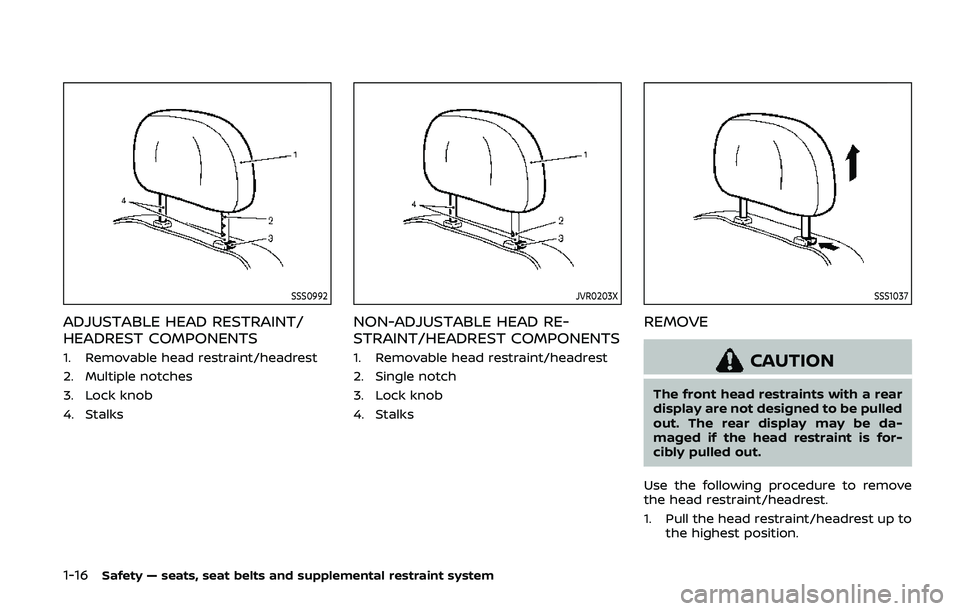
1-16Safety — seats, seat belts and supplemental restraint system
SSS0992
ADJUSTABLE HEAD RESTRAINT/
HEADREST COMPONENTS
1. Removable head restraint/headrest
2. Multiple notches
3. Lock knob
4. Stalks
JVR0203X
NON-ADJUSTABLE HEAD RE-
STRAINT/HEADREST COMPONENTS
1. Removable head restraint/headrest
2. Single notch
3. Lock knob
4. Stalks
SSS1037
REMOVE
CAUTION
The front head restraints with a rear
display are not designed to be pulled
out. The rear display may be da-
maged if the head restraint is for-
cibly pulled out.
Use the following procedure to remove
the head restraint/headrest.
1. Pull the head restraint/headrest up to the highest position.
Page 37 of 536
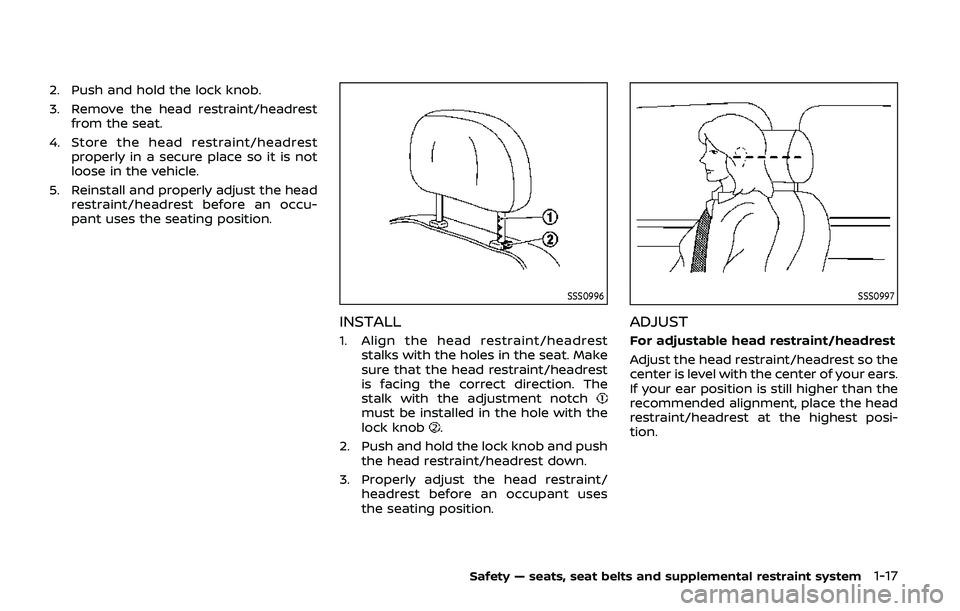
2. Push and hold the lock knob.
3. Remove the head restraint/headrestfrom the seat.
4. Store the head restraint/headrest properly in a secure place so it is not
loose in the vehicle.
5. Reinstall and properly adjust the head restraint/headrest before an occu-
pant uses the seating position.
SSS0996
INSTALL
1. Align the head restraint/headrest
stalks with the holes in the seat. Make
sure that the head restraint/headrest
is facing the correct direction. The
stalk with the adjustment notch
must be installed in the hole with the
lock knob.
2. Push and hold the lock knob and push the head restraint/headrest down.
3. Properly adjust the head restraint/ headrest before an occupant uses
the seating position.
SSS0997
ADJUST
For adjustable head restraint/headrest
Adjust the head restraint/headrest so the
center is level with the center of your ears.
If your ear position is still higher than the
recommended alignment, place the head
restraint/headrest at the highest posi-
tion.
Safety — seats, seat belts and supplemental restraint system1-17
Page 60 of 536
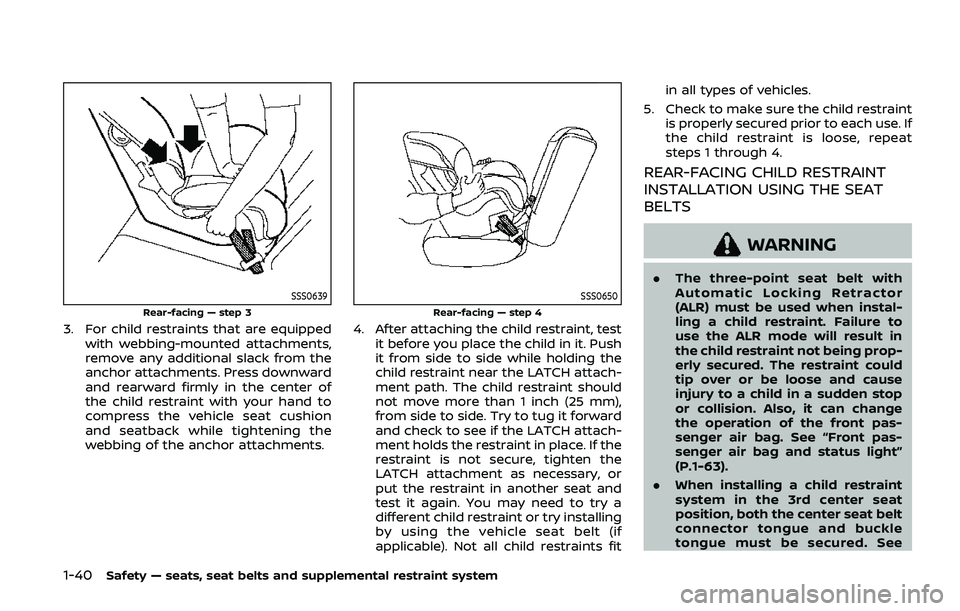
1-40Safety — seats, seat belts and supplemental restraint system
SSS0639
Rear-facing — step 3
3. For child restraints that are equippedwith webbing-mounted attachments,
remove any additional slack from the
anchor attachments. Press downward
and rearward firmly in the center of
the child restraint with your hand to
compress the vehicle seat cushion
and seatback while tightening the
webbing of the anchor attachments.
SSS0650
Rear-facing — step 4
4. After attaching the child restraint, testit before you place the child in it. Push
it from side to side while holding the
child restraint near the LATCH attach-
ment path. The child restraint should
not move more than 1 inch (25 mm),
from side to side. Try to tug it forward
and check to see if the LATCH attach-
ment holds the restraint in place. If the
restraint is not secure, tighten the
LATCH attachment as necessary, or
put the restraint in another seat and
test it again. You may need to try a
different child restraint or try installing
by using the vehicle seat belt (if
applicable). Not all child restraints fit in all types of vehicles.
5. Check to make sure the child restraint is properly secured prior to each use. If
the child restraint is loose, repeat
steps 1 through 4.
REAR-FACING CHILD RESTRAINT
INSTALLATION USING THE SEAT
BELTS
WARNING
.The three-point seat belt with
Automatic Locking Retractor
(ALR) must be used when instal-
ling a child restraint. Failure to
use the ALR mode will result in
the child restraint not being prop-
erly secured. The restraint could
tip over or be loose and cause
injury to a child in a sudden stop
or collision. Also, it can change
the operation of the front pas-
senger air bag. See “Front pas-
senger air bag and status light”
(P.1-63).
. When installing a child restraint
system in the 3rd center seat
position, both the center seat belt
connector tongue and buckle
tongue must be secured. See
Page 62 of 536
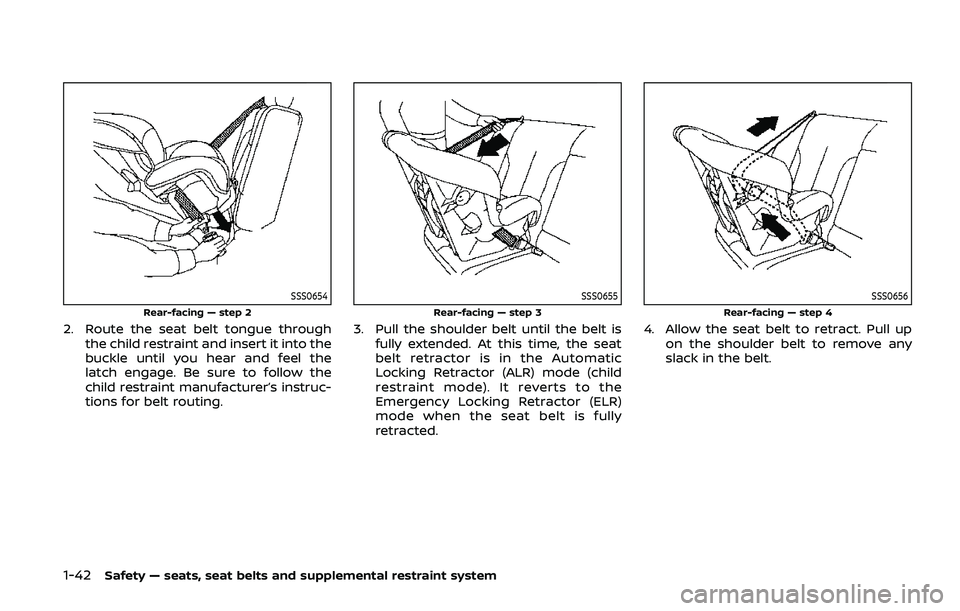
1-42Safety — seats, seat belts and supplemental restraint system
SSS0654
Rear-facing — step 2
2. Route the seat belt tongue throughthe child restraint and insert it into the
buckle until you hear and feel the
latch engage. Be sure to follow the
child restraint manufacturer’s instruc-
tions for belt routing.
SSS0655
Rear-facing — step 3
3. Pull the shoulder belt until the belt isfully extended. At this time, the seat
belt retractor is in the Automatic
Locking Retractor (ALR) mode (child
restraint mode). It reverts to the
Emergency Locking Retractor (ELR)
mode when the seat belt is fully
retracted.
SSS0656
Rear-facing — step 4
4. Allow the seat belt to retract. Pull upon the shoulder belt to remove any
slack in the belt.
Page 63 of 536
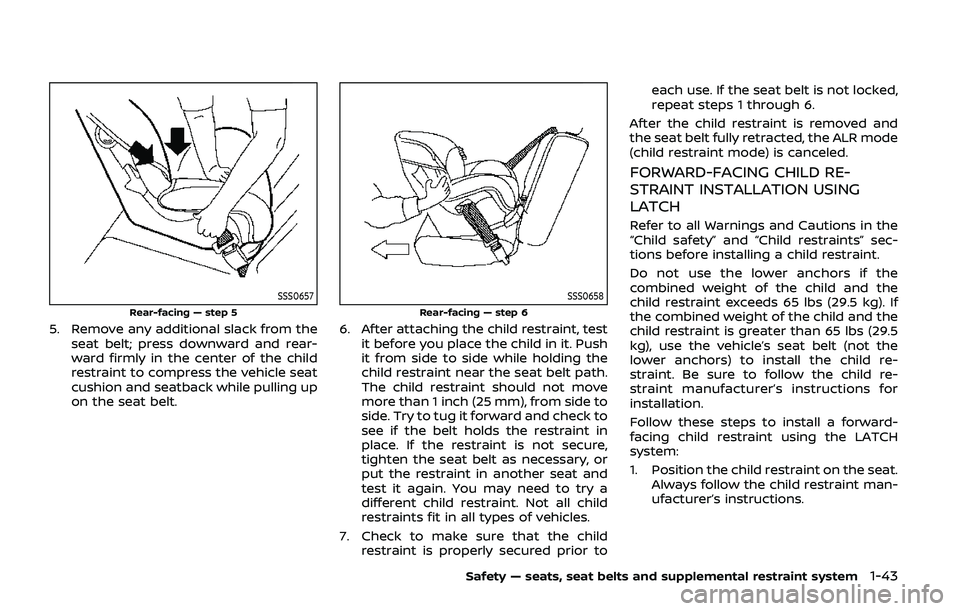
SSS0657
Rear-facing — step 5
5. Remove any additional slack from theseat belt; press downward and rear-
ward firmly in the center of the child
restraint to compress the vehicle seat
cushion and seatback while pulling up
on the seat belt.
SSS0658
Rear-facing — step 6
6. After attaching the child restraint, testit before you place the child in it. Push
it from side to side while holding the
child restraint near the seat belt path.
The child restraint should not move
more than 1 inch (25 mm), from side to
side. Try to tug it forward and check to
see if the belt holds the restraint in
place. If the restraint is not secure,
tighten the seat belt as necessary, or
put the restraint in another seat and
test it again. You may need to try a
different child restraint. Not all child
restraints fit in all types of vehicles.
7. Check to make sure that the child restraint is properly secured prior to each use. If the seat belt is not locked,
repeat steps 1 through 6.
After the child restraint is removed and
the seat belt fully retracted, the ALR mode
(child restraint mode) is canceled.
FORWARD-FACING CHILD RE-
STRAINT INSTALLATION USING
LATCH
Refer to all Warnings and Cautions in the
“Child safety” and “Child restraints” sec-
tions before installing a child restraint.
Do not use the lower anchors if the
combined weight of the child and the
child restraint exceeds 65 lbs (29.5 kg). If
the combined weight of the child and the
child restraint is greater than 65 lbs (29.5
kg), use the vehicle’s seat belt (not the
lower anchors) to install the child re-
straint. Be sure to follow the child re-
straint manufacturer’s instructions for
installation.
Follow these steps to install a forward-
facing child restraint using the LATCH
system:
1. Position the child restraint on the seat. Always follow the child restraint man-
ufacturer’s instructions.
Safety — seats, seat belts and supplemental restraint system1-43